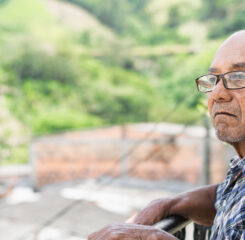Let’s Do Even More
Can you do something?
An old friend sent me this plaintive request after spending time with her sister, who is living with dementia. She was clearly distressed, but not about her sister’s cognitive ability. What has her worried is the inability of family members to engage with her sister in a way that is person-centered and empowering.
My friend has more questions than I can answer.
Why do family members routinely argue with her sister about facts like the date of her mother’s death? (Her sister’s insistence that their mother died last week calls for sympathy, not correction, my friend reasons.)
Why do family members treat her sister as if she has a terminal illness? (My friend would prefer they recognize that her sister has a disability, and then search for accommodations to improve her sister’s quality of life.)
And, most important, why hasn’t any health care professional offered family members much-needed insights into her sister’s lived experience? (The doctor simply writes prescriptions for drugs that aren’t helping, laments my friend.)
My friend doesn’t blame her family. She assures me they are very good and loving people who simply are out of their depth. But she does blame those who could help but don’t. Sadly, most people in the family’s support network – doctors, friends, relatives – are pulling away, not coming closer.
She also wants to know what LeadingAge and its members are doing to ease the family crises that she imagines are playing out in thousands of kitchens and family rooms, just like her sister’s, around the country.
I assured her that important work is taking place on a variety of fronts.
Dementia Friendly America: As co-chair of Dementia Friendly America (DFA), I’ve seen firsthand how much can be accomplished when businesses, health care systems, housing providers, and governments in the DFA network come together at the community level to support people living with dementia and their care partners. DFA also coordinates the U.S. Dementia Friends program, which educates ordinary people about what it’s like to live with dementia. If you haven’t already joined DFA, I urge you to do so.
The Learning Hub: LeadingAge’s Learning Hub, our online education portal, gives providers the tools they need to help people with dementia continue to live well after their diagnosis. I love these resources because they feature lessons people living with dementia have taught us about how they want to live, and how we can help them achieve their goals. I recommend you explore 3 features: Rethinking Dementia: A Positive Approach, Living Well With Dementia, and Dementia: The Lived Experience.
Time Slips: Last year, we announced our investment in the NextGen program pioneered by TimeSlips, a nonprofit creative engagement network serving people living with dementia and their care partners. Through the program, LeadingAge members and other care providers are giving students, educators, and older adults living with dementia an opportunity to engage together in creative pursuits that are good for the soul. In the process, we’re preparing young people to understand, accept, and empower people living with dementia.
I’m proud of the work LeadingAge is doing to reduce the stigma associated with dementia and to raise the bar on supporting people living with dementia and their family members.
Are members doing even more at the local level? Definitely.
It would be impossible to describe here the myriad ways LeadingAge members are supporting people living with dementia and their care partners. But I’ll mention 3 outstanding examples: The Dementia 360 program developed by Presbyterian Senior Care Network in western Pennsylvania; the CARE program at Joy’s House, an adult day provider in Indianapolis; and the Navigating Dementia program at LiveWell Dementia Specialists in Plantsville, CT.
LeadingAge is proud to be associated with these – and many other – member-sponsored programs, which are making a very real and very important difference in the lives of older adults and their families as they navigate the dementia journey.
Is there even more we could all be doing? Absolutely.
We’re open to your suggestions. And we’d love to hear how you are responding to my friend’s request that we “do something” to help families like hers.

Most Recommended
January 14, 2025
CAST’s Evolution: Reflection on What’s Ahead
February 21, 2025
 Improving Medicare Advantage
Improving Medicare Advantage
Recently Added
February 28, 2025
HUD to Cut Field Office Staff by May 18
February 28, 2025
HUD Terminates Fair Housing Rule
February 26, 2025



